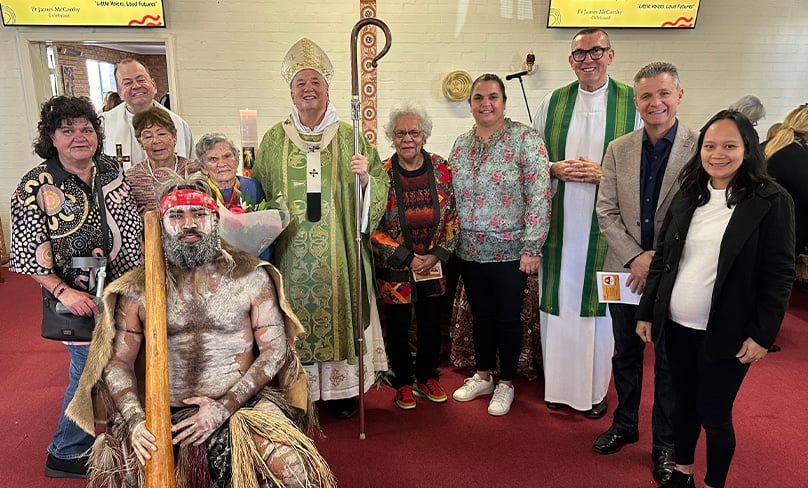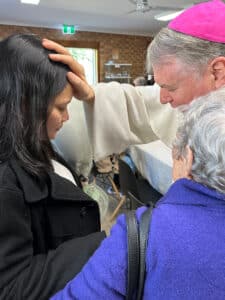
This is the homily given by Archbishop Anthony Fisher OP at the Mass for Aboriginal and Torres Strait Islander Sunday and 13th Sunday of Ordinary Time Year A, The Reconciliation Church, Phillip Bay, 2 July 2023.
Sixty years ago next month, the Yolngu people of northeast Arnhem Land sent two bark petitions—framed by traditional ochre paintings—to the Federal Parliament, protesting the grant of mining rights in Arnhem Land and seeking Parliament’s recognition of their title and traditional rights. This protest was a marker in the long struggle of Aboriginal and Torres Strait Islander peoples for acknowledgment of their past and present existence, their sufferings, attachments and cultures, their human rights and gifts.
The ’67 Referendum and 2008 Apology were also watershed moments, along with the 1976 statutory acknowledgment of native title, the 1991 Report of the Royal Commission into Aboriginal Deaths in Custody, and the 1992 Mabo Case negating terra nullius. The 2017 Uluru Statement from the Heart, was just the latest marker in a long, slow progress towards what St John Paul II called a “just and proper settlement with Aboriginal peoples”.[1]
Parallel to this, the Catholic Church made strides in appreciating the gifts of its Indigenous members and in drawing attention to unresolved issues of justice and reconciliation. 1973 saw the first Australian Aboriginal Liturgy celebrated during Melbourne’s Eucharistic Congress. In 1986 Pope St John Paul II said that the Church in Australia would only be fully the Church Jesus wants when the contributions of Aboriginal Australians have been offered and joyfully received by others.[2] In 1992 the Australian Bishops established the National Aboriginal and Torres Strait Islander Catholic Council. At the 2008 World Youth Day young Aboriginal Catholics welcomed the youth of the world to these shores and celebrated their faith with them, while our beloved Auntie Elsie Heiss welcomed Pope Benedict in her native language and then in his. On the 30th anniversary of John Paul II’s Alice Springs address, Pope Francis reiterated the call for a sharing of traditions, so that they “witness to the power of the Gospel to perfect and purify every society”.[3]
As Church and society have made advances in acknowledging, collaborating with and supporting Indigenous peoples, many Aboriginal Australians have grown in self-confidence in living “with a foot in both camps” of their Aboriginality and Australianness, or their Aboriginality and their Catholicity, drawing upon each while contributing to and challenging the rest of the community. I was only a toddler at the time of the bark petitions and I thank God for the progress there has been towards recognition and reverence, reconciliation and reparation. But no-one should pretend that long journey is yet complete.
So, what might our Catholic tradition say to the emu in the room: the forthcoming Referendum on the Voice? There are strong feelings and divergent views amongst Aboriginal Australians, and amongst Catholics, like everyone else. Many people do not take kindly to being told how to vote by prelates and we bishops have no special magisterium on how best to secure the good of First Nations peoples in such complex areas.

But if fools march in where angels fear to tread, so sometimes do bishops—so here goes… Today’s readings are big on hospitality. In our first (2Kings 4:8-16), a Shunemmite woman gives an extraordinary welcome to a stranger. (We don’t know her name, but one of my brother bishops suggests it’s Aunty Beryl.) Judging Elisha a holy man, she gives him food and lodging and convinces her husband to build a humpy out back where the guy could stay whenever he passed that way. Elisha needs a translator to communicate with her. But through her generosity, they all encounter God, and she is rewarded with a child.
In our Gospel (Mt 10:37-42) Jesus calls for 100% commitment from His disciples, in return for which He promises eternal life. He then adds that anyone who is hospitable to a priest, prophet, or ordinary disciple will also be rewarded. In the harsh countryside of the Middle East, physical survival depended upon people being hospitable; even in easier countryside, missionaries relied upon generous locals.
In Aboriginal Australia, strangers who came in peace and sought permission to pass were commonly welcomed and provided with sustenance, protection, company and direction. Again, such welcome was a matter of survival for nomadic people. And, there was an implicit recognition that, in the words of our national anthem, there were “countless plains to share”. So “Welcome to Country” can be more than faux permission, tokenism or virtue signalling: it can be a deeply human and spiritual activity that speaks of mutual respect, invitation and sharing, one which can, in Pope Francis’ words, be “purified and perfected by the Gospel”.
In addition to mutual respect and willingness to share, the current debate over Indigenous recognition and voice suggests some other aspects of the Christian social Gospel, such as: recognition of universal human dignity; acknowledging truths and accepting responsibility regarding past, present and future; enabling those most affected by decisions to help inform them; and a passion for the common good and especially for the poor that makes ‘gaps’ between what Indigenous and other Australians experience deeply troubling—gaps in health, education, housing, security, incarceration or economic development. As Christians hear the Gospel call to do what they can for “the least of these” (Mt 25:31-46), they know they need the wisdom and buy-in of Aboriginal Australians themselves.
The Gospel has much more to say about sin and reconciliation, sharing land and water, rights and limits to private property, immediate and extended family, and more. If we are to make progress towards what John Paul called “a just and proper settlement with Aboriginal peoples”, it must be with such ideals in mind.
Brothers and sisters, regarding the Referendum and the Voice, many are annoyed by how long it has taken; others feel rushed, bullied, kept in the dark. Some say it’s mere tokenism and not enough; others are anxious about overreach. Some think the measure will contribute to reconciliation and a better democracy; others that it is feeding racial division and undemocratic. One way or another, the principles of Christian hospitality should inform the process going forward: presuming each other’s good faith; letting everyone speak and be heard; hearing the arguments and the hurt; recognising that others have interests and concerns also, so that compromise will be necessary; and being ready to respond wisely, justly and charitably. We know that people of good will and principles can draw different conclusions about the best constitutional, legal and political arrangements—but our goal must be serving the common good.
I pray that our national conversation and decisions going forward will be informed by attitudes like that of the Shunemmite Aunty, by teachings like those of Jesus about hospitality towards the least, and by practices like those of the ancient Aboriginal peoples welcoming strangers and yarning with them respectfully.
[1] Pope John Paul II, Address of the John Paul II to the Aborigines and Torres Straight Islanders in Blatherskite Park, 29 Nov 1986. 10, 13. https://www.vatican.va/content/john-paul-ii/en/speeches/1986/november/documents/hf_jp-ii_spe_19861129_aborigeni-alice-springs-australia.html
[2] Ibid.
